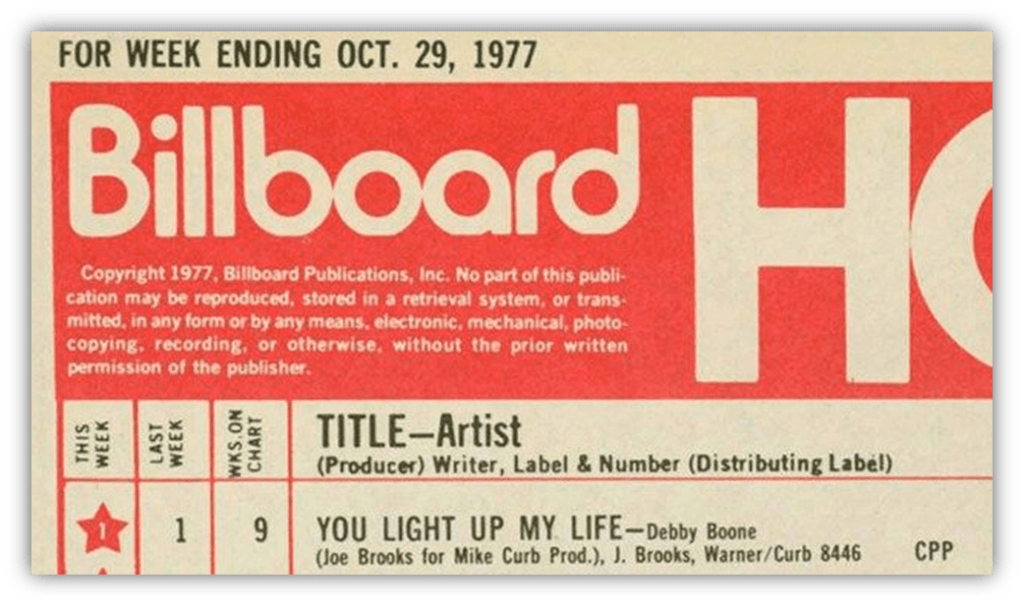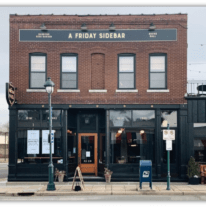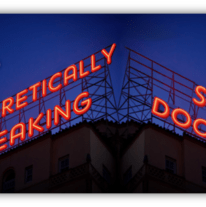When I listen to an American Top 40 Countdown from 1977, it’s hard to separate my own growing up from that of pop radio.
I turned 14 in the summer of ’77 and started high school that fall.
So it’s safe to say that there were a lot of personal moments of wondering:
- what was going on
- where I was heading
- why was my voice deeper
- my body sweatier… and everything just more intense …

When I turned on the radio, it felt to me like everyone else was in a similar mood.
If nothing else, sex was on the airwaves, in all sorts of forms.
It wasn’t like the year before – when Donna Summer’s “Love to Love You Baby” or Hot Chocolate’s “You Sexy Thing” were offset by “Convoy,” “Junk Food Junkie” and the themes from “Welcome Back, Kotter” “Happy Days” and “S.W.A.T.”

In 1977, Mary MacGregor, William Bell and the self-titled (and self-evident) vocal group Hot were all singing about loving more than one person at a time.
Dean Friedman’s goofy romance ended with bombs bursting in “Ariel.”
Alan O’Day went to Number One, looking for his “Undercover Angel.”
And Meri Wilson stirred up a storm in my Pennsylvania summer town with her salacious escapade with the “Telephone Man’.
Jennifer Warnes warbled about the “Right Time of the Night” for making love, while the Steve Miller Band sang about “Jungle Love” driving them mad and making them crazy. Even Natalie Cole, in her own tasteful, adult R&B way, crooned, “I’ve Got Love on My Mind,” leaving no doubt what she meant.
The serious, thoughtful hits were also suffused with sexuality.

Rod Stewart’s “The Killing of Georgie” was the first time I’d ever heard the word “gay” (in contemporary parlance) in a Top 40 hit.
And singing about practicing his “Night Moves” brought Bob Seger Hot 100’s Top 10 for the first time.
As a 13-year-old going on 14, listening to these lyrics made me wonder about the others.
Did I have a dirty mind for thinking whether there was more between the lines in “I’m in You,” “Couldn’t Get It Right” or “So In to You”? “Feels Like the First Time” seemed obvious.
But what about “Got to Give It Up,” “I’m Your Boogie Man” or even “Looks Like We Made It”?
Fortunately, if all of this listening and wondering got me hot and bothered (or at least bothered,) singer-songwriter Peter McCann was there to put it all in perspective.
Ironically, of all the songs from the summer of ’77 to make AT40, the one that irritated my Aunt Elaine so much was “Do You Wanna Make Love?”
I’m positive it was because of the frank title.

And that’s how all the trouble began...
If she’d given the song’s lyrics half a chance, she would have realized that, in the post-“free love” era, it actually had something to say about relationships and honesty:
“Where love goes a fool knows that the hurt can go as deep
Peter McCann – “Do You Wanna Make Love?”
Don’t make a promise that you cannot keep
Do you want to make love
Or do you just want to fool around
I guarantee it will bring you down
If you try and fool yourself
Do you want to make love
Or do you just want to fool around
You can take it seriously or take it somewhere else”
Billboard Hot 100 #5, August 1977
As a virginal teenager, those lyrics spoke to me.
Heck, as an about-to-be-60-year-old, those lyrics still speak to me.
I don’t find them preachy or moralistic, just real. It’s important to know why you want to do what you want to do before you do it, lest you hurt yourself and someone else. OK.
Aunt Elaine never gave it a chance. The dial changed as soon as that song came on.
Of course, to be fair, she also changed the dial for most of the other songs mentioned. In the summer of ‘’77, that meant a lot of dial-changing – if not just turning the radio off and encouraging us to go do something else.
Something else, of course, meaning not exploring the subject of those songs.
It could very well just be me – but Top 40 music before the summer of ’77 seemed more adolescent. Afterward, more adult.
(Today, it’s almost unrecognizable. I’m grateful Aunt Elaine was already far, far away from the radio and pop culture when “WAP” went to Number One.)

By the fall of ’77, I had more important things to think about .
…traveling more than an hour by school bus to get to high school on time, struggling to pass Algebra I, dealing with the sophomore bully in P.E… The lyrics of the Top 40 weren’t quite as much on my mind.
It’s possible the nation felt the same way. After all, from October 1 until the end of the year, the last song on AT40 was either Meco’s “Theme from Star Wars” instrumental …

Let the author know that you liked their article with a “heart” upvote!”






The Japanese translations of those Peter McCann songs are interesting. “Do You Want to Make Love” was turned into “Lover’s Afternoon,” while “Right Time of the Night” morphed into “Promenade of Starlight.” Still not as good as “Dumb and Dumber” becoming “Mr. Dumb.” 😄
I don’t know if there was a better time on the radio for adolescents than the mid 90s. The volatile emotions, the low self esteem, the sexual frustration, it was all there right out in the open. Way too open for your Aunt Elaine, but usually not so porntastic as WAP.
The best selections from that time:
Nirvana: Dumb
Smashing Pumpkins: Disarm
Blind Melon: No Rain
Offspring: Self Esteem
Radiohead: Creep
Crash Test Dummies: Mmmm Mmmm Mmmm
Green Day: Longview
4 Non Blondes: What’s Up?
Beck: Loser
Even Tom Petty painted a teen vibe with You Don’t Know How It Feels To Me Be
“ The best selections from that time:
Nirvana: Dumb
Smashing Pumpkins: Disarm
Blind Melon: No Rain
Offspring: Self Esteem
Radiohead: Creep
Crash Test Dummies: Mmmm Mmmm Mmmm
Green Day: Longview
4 Non Blondes: What’s Up?
Beck: Loser
Even Tom Petty painted a teen vibe with You Don’t Know How It Feels To Me Be”
Now we’re talking, those were songs from my 14 and 15 (I don’t quite remember Nirvana and Green Day’s songs though), and probably would add Collective Soul’s “Shine”.
If Aunt Elaine heard the radio edit of WAP she would have no idea what it was about. It’s so redacted you’d think they were rapping leaked pentagon memos.
Or the world’s best egg salad recipe.
I mean, it kind of is, isn’t it?
Re: the Meri Wilson video:
“A-singin’ do lolly, lolly, Shicky bum, shicky bum.”
I’d like to apologize in advance for the earworm.
It’s gonna be a long day.
Tom in the adjacent cube JUST discovered that song about a month ago, and was aghast at how stupid it was, at how provocative it was for the 70s, and that I had never mentioned the song before.
Re: the last part. That doesn’t surprise me. 🙂
I’ve never heard of Meri Wilson. I feel its best to rely on this brief extract of lyrical gold and let my imagination do the rest.
It’s no ‘ooh wee, chirpy chirpy cheep cheep’.
“Telephone Man” makes the gang from Middle of the Road look like Renaissance.
https://www.youtube.com/watch?v=HSNSTerj2Kc
Makes me want to drive a bitchin camaro.
If anyone wants a suggestive earworm, the 60s has some good lollies:
https://www.youtube.com/watch?v=MoMv1njA1GA
Thanks to TNOCS, I learned of Sylvia’s “Pillow Talk” and fell in love with it. A few years earlier, but just as inappropriate for terrestrial radio.
Fun to consider:
Without Mickey and Sylvia, there was no Sylvia.
And without Sylvia, there was no Sugarhill Gang.
1977 was the end of my freshman year of college and the start of my sophomore year. I was too busy listening to entire albums to worry about the Top 40 so I don’t remember any drastic change. I’ll say this though. As it was my first time away from home and with a real live girlfriend, 1977 was indeed a sexy year.
Aunt Elaine would not have approved of summer/fall 1991 over here. Right Said Fred spent 6 weeks at #2 with I’m Too Sexy only to be replaced in runners up spot for the next 2 weeks by Salt N’ Pepa saying Let’s Talk About Sex.
If that was too much to bear then not to worry as the earnestly craggy face of Bryan Adams was keeping a sense of propriety at the top with the 16 week run of (Everything I Do) I Do It For You. Though I guess sex may have been involved, its upto the listeners imagination as to what it was he was doing for you; grouting the shower cubicle, eviscerating the Sheriff of Nottingham, descaling the kettle…..insert readers own joke about summer of ’69
In the summer of ’77, I was completely free of parental supervision for the first time. Although pretty much glued to the radio 24/7, I can’t say that I noticed that the music was considerably more obsessed with sex than before. I thought it was just me. But now that you point it out, I realize that it was both of us.
I had an Aunt Lee who was a kindred spirit to Aunt Elaine. If we were listening to a record with any mention of sex, we had to make up nonsense lyrics and sign them very loud to avoid consequences. The consequences were usually having the record Frisbee’d into the front yard, with no concern for how many weeks of allowance it had cost. We learned to be very careful.
Yay! Olivia Newton-John is on Solid Gold. So I’m in the living room with my mom and her mom. And John performs “Physical”. That was uncomfortable. Even in the pre-Internet era, and our house not having cable, child me had a pretty good idea what John was talking about. The song ended. Complete silence. I think we all decided to pretend that “Physical” never happened.
Madonna saw this, and thought: I’m younger.
ONJ never gets credit for inventing Madonna.
Right on. There is no “Like a Virgin” without “Physical” paving the way. (Although, honestly, I did not care for “Physical.”)
Oh, agree, agree, agree. My earliest musical memory is hearing “Have You Never Been Mellow” and “Loving You”. I thought it was the same song, the same artist. I mean, this was a very early remembrance.
I like Xanadu-era ONJ. “Suspended in Time” sounds like a bigger hit than it was. I guess, by that time, everybody had bought the soundtrack.
I guess I felt like the guy in “Centerfold” who couldn’t believe what happened to his “homeroom angel”.
I’m OK with a more assertive Olivia: I loved “A Little More Love” and “Deeper Than the Night,” for example. But “Physical” struck me as a forced attempt at image change, just like Sheena Easton’s “Sugar Walls.”
Olivia is good on both sides of her transformation. “Have You Never Been Mellow” is great as is “A Little More Love”. “Hopelessly Devoted to You” is great as is “Heart Attack”. But “Physical” stinks.
Can’t Sandra Dee just be herself??
Have you seen Grease? Stockard Channing could be Sandra Dee’s mother.
Here’s some useless trivia. Angela Lansbury plays Laurence Harvey’s mother in The Manchurian Candidate. The difference in ages of the two actors is three.
Your post got me wondering, Chuck – maybe the ‘naughty’ songs are always there, it’s just dependent on the listeners age at that moment?
1987 was when I turned 13. Middle School dances are always a disgusting mess of hormones, and naughty songs in 1987-8 were their soundtrack to the stifled giggles. For me, I got the gist when songs were supposedly naughty pre-1987, but the lyrics were usually an afterthought. Post 1989, I felt in on the joke, and naughty songs were no longer a big deal to me (or my parents, who may have been concerned about what I was listening to pre 1989).
But right in that eye of the hormonal hurricane, I distinctly recall these songs getting the stink eye from dance chaperones-
– Pour Some Sugar on Me (Def Lep)
– Talk Dirty to Me (Poison)
– I Want Your Sex (George Michael)
– Touch Me (Samantha Fox)
– Nasty Girl (Vanity 6)
– Boom Boom (Paul Lekakis)
– Mony Mony (Billy Idol – solely because of the “Hey Hey Hey Get Laid Get F***ed” chant everyone would scream during the verse intro)
I’m sure there are plenty of others I’m forgetting. But, yeah, definitely an interesting question to ponder – are some years more naughty than others, or is it just when the listener turns 13 that they all suddenly sound particularly naughty?!
I was 12 in the summer of 1977 and remember Ariel being played a lot on my local radio (Raleigh-Durham, North Carolina), and boy, did that do a number on my preadolescent self. By the final verse before a reprise of the chorus, when Dean Friedman sang, “I took her home with me/We watched some TV/Annette Funicello and some guy going steady” followed by a honking boat horn at the end to make it sound even more suggestive, I was hooked. Quite a surprise for me to encounter at the time.
But look, you could point back to songs popular 10 years earlier (e.g., Lou Christie’s “Lightning Strikes”) or 20 years earlier (Julie London’s “Cry Me a River”) to find a certain level of horniness being referenced, perhaps obliquely, but still there. It wasn’t as blatant as a lot of what we’ve had in the 21st century, but then, what in any other field of entertainment wasn’t as blatant last century either?